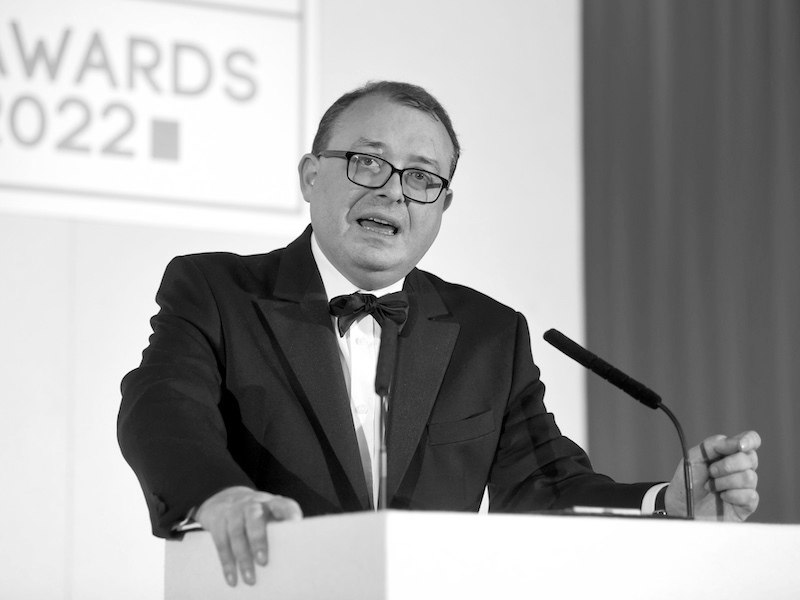Arun Sudhaman 20 Mar 2023 // 8:31AM GMT

Francis Ingham, who led the PRCA for 16 years, turned a once moribund trade association into the global PR industry’s most influential champion of progress and professionalism. He died on Thursday 16 March at the age of 47, after a short illness.
Possessed of a keen intellect, a pugilist’s love of the headline fight and a provocative mastery of campaigning, Ingham’s passion and energy for the public relations profession ensured a leading role as the industry confronted a range of 21st century challenges. Along the way, his unique worldview — shaped, perhaps, by his earlier career in politics — meant that anyone he met could be friend, collaborator or enemy, sometimes all at the same time. By turns uproarious and insufferable, it is doubtful the PR world will ever see his like again.
A difficult childhood in Manchester preceded Ingham’s emergence at Wadham College in Oxford, where he became involved in Conservative politics. After local work in Enfield, Ingham served as senior policy adviser to the Confederation of British Industry before a stint as a consultant on Steve Norris’ failed bid to become London Mayor. In 2004, he became assistant director general of the Chartered Institute of Public Relations (CIPR), at that point the UK’s leading PR trade association — where he oversaw lobbying, stakeholder relations and campaigning activity.
In 2007, Ingham made the fateful decision to decamp to the Public Relations and Communications Association (PRCA). It was not an auspicious start — Ingham could not hide his horror with an awards event in his first week — and few expected much from either the aimless organisation or the public affairs specialist who, mystifyingly, often appeared considerably older than he actually was.
Looks turned out to be deceiving. Ingham took to the role with unbridled zeal, bringing the kind of focused energy that the PRCA had lacked for many years. Positioning the CIPR as his mortal enemy also helped, reflecting how Ingham’s zero-sum view of affairs would come to characterise his approach to many events over subsequent years.
Even so, Ingham’s success at the PRCA — where membership, revenues and influence surged — owed just as much to his ability to build effective partnerships with a broad range of people, from industry bigwigs to journalists and activists. Lunch, not for the faint of heart, was his preferred medium. Whether Boisdale, L’Escargot or — in his later years — Shepherds, Ingham struck alliances, shared gossip and always paid the bill. It was a relatively simple formula that mostly won him loyalty, support and even affection from the many industry executives that he wined and dined over the years.
Amply lubricated by this approach, the PRCA's many cogs rotated efficiently, bringing significant influence to bear on such areas as professional development, standards, apprenticeships, events and lobbying. The organisation grew rapidly, with Ingham also taking over its global umbrella body ICCO in 2013. But there was little doubt that regular business growth was rather too pedestrian for his imperial ambitions. Victories were needed, with Ingham keenly aware of the need to demonstrate that the PRCA would fight, and fight hard, on behalf of the industry. And his career will likely be remembered for these, above all else.
The battle with the Newspaper Licensing Authority came first, with Ingham taking the case all the way to the European Court of Human Rights. That he might not have extracted quite as many concessions as he boasted was hardly the point; the PR industry was not best known at that time for its backbone. Ingham, always conscious of his own personal stature, was determined to change that.
In a sector that typically wilts when confronted by mainstream media criticism, Ingham emerged as one of the few people who would not only consistently and coherently defend the public relations industry, but also tout its many accomplishments. It was a campaigning model that won him considerable plaudits, burnishing his reputation and helping build the PRCA’s global brand. If the rhetoric sometimes outweighed the reality, few were about to quibble.
The apogee of these efforts, no doubt, was Ingham’s decision to pursue the expulsion of Bell Pottinger from the PRCA in 2017, after it was accused of stoking racial tensions in South Africa. Bell Pottinger’s status as one of the UK’s largest and most powerful PR firms had often rendered it impervious to this kind of criticism, but Ingham smartly calculated that the battle not only needed to be fought, but could be won. The global PR industry rallied behind the PRCA’s efforts to enforce its code of ethics, and Bell Pottinger soon collapsed into administration.
The drama brought front page headlines and plenty of acclaim, but victory did not always bring out the best in Ingham. Post-Bell Pottinger, his flaws and foibles — exacerbated by heavy drinking — started to visibly dominate his behaviour. Criticism of his leadership style, once muted, became commonplace in industry circles. The pandemic did not help; not only was Ingham singularly committed to work above all other pursuits, but his modus operandi depended on his own mercurial brand of personal connection.
By 2022, the PRCA was forced to call a governance review and investigate complaints into Ingham’s conduct, some of which were triggered by his desire to insert himself into the Russia-Ukraine war. The realisation that Ingham was seriously ill may well have taken hold slowly, not least because of his penchant for tall tales where injuries and illness were concerned. Ultimately, counsel and support from his many friends across the industry proved fruitless.
It is worth noting the scope of the organisation that Ingham leaves behind, and the remarkable transformation he oversaw from its modest origins. The PRCA now accounts for 35,000 members, extended across regional associations in Asia-Pacific, EMEA and the Americas. ICCO numbers 41 PR associations across the world, representing 3,000 PR firms in 70 countries. Both organizations have played an important role in terms of professionalising the global industry, with a particular focus on such areas as industry ethics, mental health and climate change.
Ingham is survived by four children.
Industry friends and colleagues have paid tribute to Ingham here.
Additional reporting by Maja Pawinska Sims


































.jpg)

















